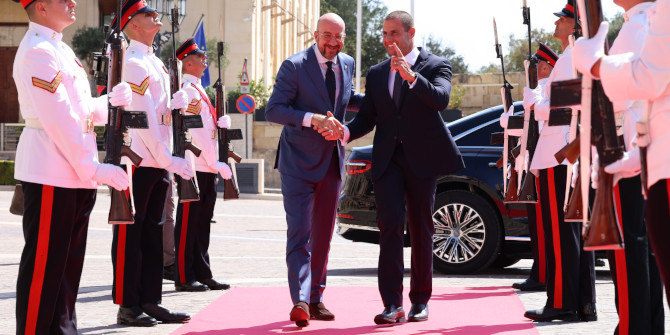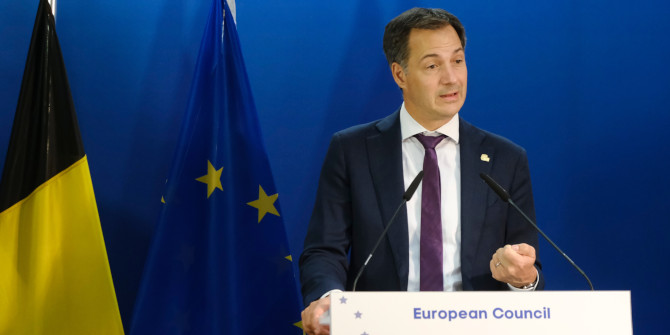Bulgaria will hold simultaneous parliamentary and European elections on 9 June. Petar Bankov writes the elections are unlikely to bring an end to the country’s prolonged political instability.
This article is part of a series on the 2024 European Parliament elections. The EUROPP blog will also be co-hosting a panel discussion on the elections at LSE on 6 June.
The past European Parliament elections in 2019 feel like an eternity away, viewed through the prism of Bulgarian politics. Five years ago, the main competition was between the centre-right Citizens for European Development of Bulgaria (GERB) and the centre-left Bulgarian Socialist Party (BSP), while nationalist and liberal conservatives lagged well behind the liberal centrist Movement for Rights and Freedoms (DPS), the main representative of the sizable Turkish minority in Bulgaria.
Since then, the Bulgarian political landscape has experienced a major overhaul, characterised by growing fragmentation, the marginalisation of the left and the increasing strength of right-wing parties, ranging between the liberal right to the populist radical right. This overhaul will most likely be reflected in the Bulgarian representation in the European Parliament (Table 1).
Table 1: Results and polling in European Parliament elections in Bulgaria
Note: Data for 2024 elections based on a poll of polls from Market Links (29 Apr-9 May), Alpha Research (28 Apr-5 May), Gallup International Balkan (22 Apr-2 May); polls weighted cumulatively based on the timing of the final day of polling and on the average deviation between their final polls on the five parliamentary elections between 2021 and 2023 and the actual results of these elections. Data on PP-DB from 2019 includes DB only; DB’s current MEP is a member of the EPP group; PP indicated its interest in joining the ALDE group. ITN has indicated its interest to join the ECR group.
The upcoming elections on 9 June will be dual ones – aside from the vote for the European Parliament, there will also be an early parliamentary election. Bulgaria has developed a habit of early elections – this will be the sixth time since 2021 when people will go to the polls to elect their representatives in the National Assembly, making the country the post-war democracy with the most parliamentary elections held within the shortest period.
This political instability has institutional roots – the past four years saw the consistent failure of the Bulgarian political elite to find a consensus on the future direction of the country. The old guard, represented mainly by the established parties, GERB, BSP, and DPS, advocate for gradual reforms that preserve their political and economic influence.
Meanwhile a new(-ish) generation of politicians and parties, mainly represented by the liberal centrist We continue the change (PP), the liberal right Democratic Bulgaria (DB), the populist radical right Revival, and the populist conservative There is Such a People (ITN), seek a radical and rapid change in the country but in different directions. On the one hand, the PP and DB advocate for thorough anti-corruption and judicial reforms aimed at a deepening the European integration of Bulgaria; in contrast, Revival openly rejects Bulgarian membership of the EU and NATO, whereas ITN stands for a Europe of nations.
For their part, GERB and DPS remain supportive of Bulgarian integration in the EU, although this may be due to their efforts to cleanse their tarnished public image. In 2021 and 2023 key politicians, notably the current co-leader of DPS, Delyan Peevski, were added to the Magnitsky List of US-sanctioned persons and businesses accused of corruption in the spheres of the energy sector, and in the legislative and judicial branches of power; the UK followed suit in 2023 by adding Peevski to their list of sanctioned persons. The BSP maintains a rather soft Eurosceptic position, criticising any further European integration and the perceived treatment of Bulgaria by the EU as a second-class member.
A European consensus
While the political divide described above emphasises the distance between the parties in their European positions, in practice, these differences are less clear-cut. Overall, there is an overwhelming consensus among the Bulgarian political elite in favour of the European integration of Bulgaria, which transcends the political divide.
In fact, the last year and a half saw the rule of a grand “assemblage” (sglobka) between GERB and the alliance of PP and DB. This was a rotating coalition government set around the common goals of achieving Schengen and Eurozone membership for Bulgaria, as well as constitutional reform in the judiciary and – as it happened – curtailing the powers of the President in case of a political crisis.
The uneasy coalition managed to pass these constitutional changes in late 2023, while on 31 March 2024 it partially achieved its Schengen goal, as Bulgaria entered the area by sea and air, though the main prize – Schengen membership by land – remained elusive. The end of the coalition came as both sides could not agree in March 2024 on the principles of the rotation and on the future mode of coalition work, leading to the call for early elections in June.
Such a consensus extends even further towards topics where parties may potentially disagree. Disagreements over the North Macedonian accession process to the EU mainly revolve around how firm the Bulgarian position should be in opposing North Macedonian calls for a revision of the so-called French proposal, which requires North Macedonia to amend its constitution to recognise a Bulgarian minority living within the country.
On the European Green Deal, the parties in Bulgaria make every effort possible to demonstrate their firm rejection of job losses in coal mining areas, as well as of the planned liberalisation of the energy market. On Eurozone accession, attempts by Revival to gather signatures for a referendum were denied by the parliament. It is only on matters around the Russian war in Ukraine and EU sanctions on Russia where one can see some noticeable differences, with Revival and the BSP opposing any military assistance to Ukraine and supporting the lifting of sanctions on Russia.
The need for a clear vision
In such circumstances of a broad consensus, political competition concerns mainly valence issues of competence rather than substantial political differences. This became particularly apparent around the debates over the continuous delays for submitting and revising the Bulgarian plan for the Stability and Growth Pact. Broadly, however, the consensus conceals the overall lack of a clear vision of any of the political parties in Bulgaria about what to do with the country’s membership in the EU.
The parties supportive of further EU integration have barely expressed any ideas of shaping the process to maximise its expected benefits for the country, agreeing instead with the broader direction of travel determined elsewhere. Their opponents who are sceptical of or outright rejecting this membership offer vague visions of sovereignty, which fail to recognise the geopolitical circumstances of Bulgaria being close to several major conflicts in Eastern Europe and the Middle East and the associated multidimensional challenges stemming from those.
A continuation of instability
Overall, the European Parliament elections in Bulgaria remain in the shadow of the parliamentary elections. Most parties have been late to release their manifestos for the European Parliament elections and even at a discourse level these elections are treated as second order. GERB is campaigning on the slogan of “Stable Bulgaria in a secure Europe”, while the BSP stands “For a proud Bulgaria in a peaceful Europe”. This is a logical consequence of the fixation of the Bulgarian political parties with domestic politics.
The projected results for the parliamentary elections do not deviate substantially from those for the European Parliament and the expectation is we will see another fragmented parliament with six to seven parties and alliances in it and remaining difficulties to form a stable coalition government. In this context, the dual elections in June seem unlikely to break the stalemate of frosting relations between the two main actors in Bulgarian politics (GERB and the PP-DB alliance), while another potential government configuration would be too fragile and too toxic for the images of the parties involved. All this points to the continuation of political instability with the potential for more early elections in autumn.
Such instability spells a further deterioration in the relationship between society and political institutions in Bulgaria. The past four years saw a substantial decline in voter turnout (from 52.7% in 2017 down to 40.6% in 2023), coupled with increasing support for the “none of the above option” (from 2.5% in 2017 up to 4.1% in 2023). Public trust in political institutions also remained notably low. As recent research on the unrepresented parts of society in Bulgaria reveals, an increasing number of eligible voters do not see any actual benefits and improvements in their daily lives from their political activities, leading to growing apathy and disengagement with politics.
This seems to reflect the stagnating labour market in Bulgaria despite declining inflation rates. The country has experienced a series of mass protests from different industries, such as the agricultural, coalmining, and energy branches, which were resolved through an increase in state investment in these areas. Yet, the lasting issue of a discrepancy between the concerns of the public and the elite remains: the Eurobarometer from April 2024 revealed that the top three topics of importance for the Bulgarian public at the next European elections are the fight against poverty and social exclusion (48%), support for the economy and the creation of new jobs (40%), and public health (34%) – issues that the main political parties have rarely touched upon in their debates during the campaign.
Note: This article gives the views of the author, not the position of EUROPP – European Politics and Policy or the London School of Economics. Featured image credit: Alexandros Michailidis / Shutterstock.com







